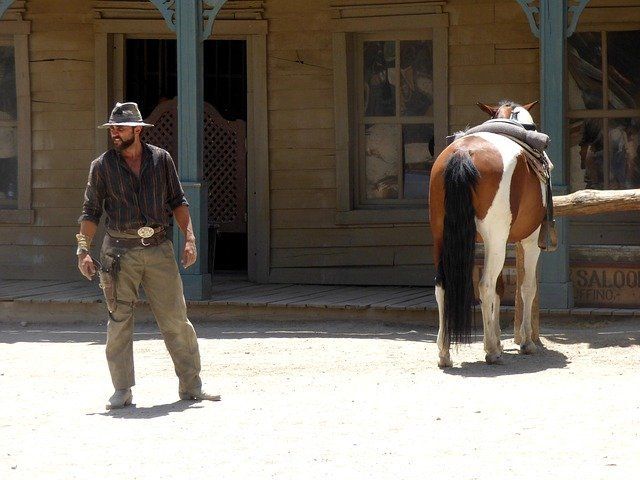A friend of mine visited one of H.M. Prisons recently to preach the Christian gospel to the inmates. A law-abiding neighbour commented, ‘Ah yes, they obviously need it; they wouldn’t be there if they didn’t.’
Most people would agree – those in jail are there because of bad actions and need converting from their evil ways.
But what about the ‘good man’? Does he also need converting? Clearly, the neighbour thought that only ‘bad’ men really need the message of God’s salvation. But is he right?
Goodies and baddies
Obviously, moral differences do exist between people. This is why in films we usually have the ‘goodies’ and the ‘baddies’ – and most of us want the ‘goodies’ to come out on top.

The bad man is the law-breaker. The good man is the dutiful citizen, who keeps his garden tidy, takes jam-jars to the recycling bin and sometimes picks up a piece of litter from the street. He is the helpful neighbour, willing to do a bit of shopping for the arthritic old lady next door.
The good man rarely feels a need for salvation. The New Testament reveals that Jesus, the Son of God, met more resistance and hostility from good people than from bad people.
Why? Because good people do not like being called sinners! Yet Jesus tells us that being good is not good enough.

How to get eternal life
A rich young man once asked Jesus, ‘Good teacher, what shall I do to inherit eternal life?’ The man was moral and upright. He kept God’s commandments. He did not steal or commit adultery, nor did he malign others with tittle-tattle. He held his parents in high regard.
In addition to all this, he had spiritual interests – perhaps like yourself. He wanted to please God, and hoped to go to heaven. This is why he asked his question (Luke 18:9-27).
It comes as a shock, therefore, to find that Jesus considered him a failure.
So where did he fail? Where all other good people fail – he lacked the one thing needful, namely, love for God. This showed itself in several ways.

What is goodness?
He failed to understand what goodness really is. People today fail in just the same way.
He thought that to be ‘good’ he had to keep the rules and respect the law of God. When Jesus asked whether he had kept some of the Ten Commandments, he replied, ‘All these have I kept from my youth’.
That’s more than most people can say – and he knew it! For him, being good was a matter of doing certain things and not doing other things.
But Jesus challenged his view of goodness: ‘No one is good but One, that is God’, he declared.
He reminded this young man (and he would remind us all) that the source of all goodness is God. And all knowledge of what goodness really is must come from God. His commandments declare it, and our own consciences bear witness to it.

The purpose of God’s moral laws is not just to provide us with a set of rules, but to bring us face to face with God himself and his holy character.
When he says that only God is good, Jesus calls us to compare ourselves with God. He wants us to think of goodness not as doing something but as being something – being morally like God.
Where does this leave the young man? Where does it leave us? By these standards even the ‘good’ man is convicted of sin, and shown to be a sinner before God. This is how the great apostle Paul became aware of his sin; and later wrote, ‘All have sinned, and fall short of the glory of God’ (Romans 3.23).
God intervenes
Secondly, the young man failed by thinking that his goodness would save him. ‘What shall I do’, he said, ‘to inherit eternal life?’ He thought he could earn his way to heaven.

The self-sufficient ‘good’ man always thinks he has the capacity to save himself. His false view of goodness leads him to think that he can achieve ‘a good life’.
This is why society always appeals to ‘the good’ in people. There is some good in everyone, they say. This belief lies behind much educational theory, and many popular sociological ideas. But experience and history both prove that man’s supposed goodness fails again and again.
What we need is divine intervention. And that is why the Son of God came into the world. ‘I have come,’ he said, ‘to seek and to save that which was lost’ (Luke 19:10).
The young man thought that all he needed was direction – ‘counselling’, we call it today. Then, he reasoned, he could do the rest. To him Jesus was just another ‘good teacher’, who could give him good advice.

How wrong he was! Jesus did not come merely to counsel us, but to be our Saviour. He came to lay down his life, ‘the just for the unjust, that he might bring us to God’ (1 Peter 3:18).
By offering up his righteous life to atone for our sins, he satisfied the justice of God, the judge of all.
And in doing so he also puts his own perfect righteousness to our account. As Isaiah prophesies: ‘my soul shall be joyful in my God, for he has clothed me with the garments of salvation, he has covered me with the robe of righteousness’ (Isaiah 61:10).
Turning to Christ
Finally, the young man failed in not turning to Jesus Christ for eternal life. His ‘goodness’ had become a snare – he thought he needed nothing from Jesus but good advice.
One of the two thieves crucified alongside Jesus knew differently. He knew he needed Christ as Saviour. With unusual honesty, he admitted the justice of his own punishment: ‘We receive the due reward of our deeds; but this Man has done nothing wrong’.

He then pleaded: ‘Lord, remember me when you come into your kingdom’, and received the amazing reply: ‘Assuredly, I say to you, today you will be with me in Paradise’ (Luke 23:42-43).
The rich young ruler thought he had kept all God’s commandments, and therefore did not need to be saved from his sin.
But he was mistaken. He had forgotten God’s very first commandment: ‘You shall have no other gods before me’. Jesus exposed the other gods which dominated his life – his money and possessions.
Jesus told him: ‘Sell all that you have and distribute to the poor, and you will have treasure in heaven; and come, follow me’ (Luke 18:22). Get rid of the god of money, and start to honour the living God!
Tragically, ‘When he heard this he became sorrowful, for he was very rich’.
Seeking forgiveness
Jesus did not tell everyone to sell their possessions! He was simply putting his finger on the controlling factor in this man’s life.
Our gods are whatever control and influence our lives. For some it is the pursuit of money and possessions, but for others it could be the love of self or pleasure, the god of fashion, driving ambition, or something else that controls our thinking and actions.
But however we look at this, the ‘good’ man has reason to repent, as well as the ‘bad’ man. The good man is a failure and desperately needs the help of a better man – the Man Christ Jesus.
We do not just need a counsellor or a guru – we need a Saviour.
Your goodness and mine will never satisfy God. Only the righteousness of Christ meets his requirements. We need to cast ourselves upon God’s mercy and seek forgiveness through Jesus Christ.






